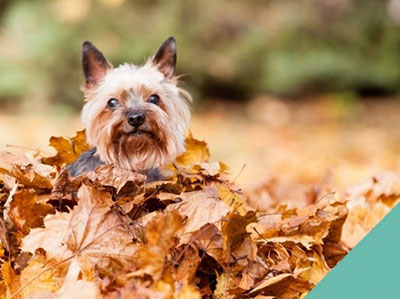
As we move from summer to autumn, nature around us changes – greens turn golden, leaves fall and summer flowers give way to berries. As always, there are things we need to be aware of that may affect our pets and their wellbeing. Here are some things to look out for this autumn.
Conkers and acorns
Hunting for conkers is one of autumn’s pleasures – searching through crunchy leaves until you spot a spiky shell or, perhaps, the shiny gleam of one that has already started to open. But if your dog eats one it could be fatal.
Conkers could cause an intestinal blockage due to their size and shape; dogs sometimes need an operation to remove them. All parts of the horse chestnut tree (including the leaves and conkers) contain a chemical called aesculin. If your dog eats enough, it causes sickness, diarrhoea and pain leading to severe dehydration and toxic shock.
Acorns and oak tree leaves are also poisonous to dogs. Acorn poisoning (officially called Quercus poisoning), causes vomiting, diarrhoea (often bloody) and lethargy. Eating acorns can lead to severe liver and kidney problems if not treated promptly. Acorns also present a choking risk and can cause a blockage in the digestive system.
Always keep a watchful eye when walking your dog in autumn, especially in areas dense with horse chestnut and oak trees.
Seasonal Canine Illness (SCI)
This is a relatively new and uncommon condition, the causes of which are unknown. Your dog will show clinical signs roughly 24 – 72 hours after walking in woodland. Symptoms are lethargy, vomiting, diarrhoea, not eating, muscle tremors and fever (high temperature). Sadly, animals deteriorate quickly and it is usually fatal. As always, if your dog displays any of these symptoms, get in touch with us for advice.
Traffic accidents
Driving on darker nights means poorer visibility for drivers and a higher risk to our pets, especially cats. High-viz, reflective collars make your kitty easier to spot at night. Try to change your cat’s routine during the darker evenings by encouraging them to stay at home, especially during rush hour when roads are at their busiest.
Alabama Rot
Whilst still uncommon in the UK, it’s good to be aware of the symptoms of Alabama rot. The cause is unknown but the main symptoms are sores on your dog’s skin (especially feet and lower limbs) and generally being unwell. The disease affects blood vessels and rapidly causes kidneys to fail. Symptoms of kidney failure include increased thirst, lethargy (extreme tiredness) and vomiting. If your dog shows any symptoms, please call us.
Osteoarthritis
If your cat, dog or rabbit has arthritis, it’s likely to worsen during the colder months. While the reasons for this are unknown, humans with arthritis will testify that the change of season causes intensified pain and stiffness. In pets this may manifest itself in slower movement and increased pain. If your pet has arthritis, ensure you give their medication at the correct dosage and times advised by your vet. Create an extra warm, cosy and comfortable place for them to rest – it can help to put a memory foam pad in their bed to ease pressure on sore joints.
Senior pets, like senior people, are more prone to arthritis. If your pet is showing signs of stiffness and pain, get in touch with us for further advice and to book a health check.
As always, we’re here to help with any concerns you may have.


News